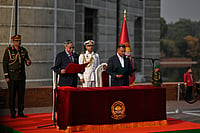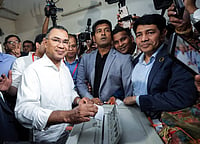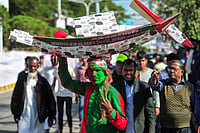Paojel Chaoba knows what it takes to be independent as a journalist. He has borne the brunt multiple times. He patiently listens to questions thrown at him and words his responses carefully. He seems to be aware of many invisible eyes, including those belonging to the powerful, waiting for him to make mistakes; and of traps for him to walk into. That does not mean he tones down his sentiments or indulges in self-censorship. “I have to be careful. According to the chief minister, I don’t count as a journalist,” he told this writer, between attending calls, answering text messages and sipping the local, digestive herbal tea heimang, sitting in his workroom at his two-storied residence in Imphal town.
It was between the first and the second phase of the state assembly election, February 28 and March 5, and Chaoba was very busy, receiving and verifying news from different sources, attending press conferences, filing reports for The Frontier Manipur, or TFM, a digital news portal of which he is one of the founders. TFM does not earn enough to sustain itself, forget making profits. “It’s surviving on donations from friends,” Chaoba tells Outlook. Throughout the period of the electoral campaign, the portal kept highlighting the mismatches in promises and deliveries, issues of poll violence and policy concerns.
Chaoba now comes in the category of a minuscule minority that Manipur chief minister Nongthombam Biren Singh described as “unregistered journalists”, apart from being “habitual offenders” and “only one-or-two among 500 journalists working in the state”. The chief minister used these descriptors during an interview with a Delhi-based national TV channel a week before the first phase of polling in the state. Another person highly critical of the government is Kishorechandra Wangkhem, also a journalist working independently, now busy building the new digital platform, The Buzzer, apart from hosting a weekly show on Elite TV, a cable-based channel that describes itself as the first 24×7 English and Manipuri news channel of Manipur.

In March last year, TFM became the first digital media outlet in India to receive a notice under the Information Technology (Intermediary Guidelines and Digital Media Ethics Code) Rules, 2021, though the district magistrate of Imphal West had to revoke the notice after the ministry intervened. Wangkhem, too, was working with TFM at that time. “Unlike print and broadcast media, the digital media is not yet recognised officially and even journalists’ unions have their doors closed on us,” says Wangkhem, who has been in and out of jail since 2018, slapped with as many as four cases, including charges of sedition and those under anti-terror laws such as the National Security Act (NSA). Overall, he has spent nearly 10 months in jail. “Independent journalists in Manipur are the worst sufferers. Besides, we have to make monetary sacrifices to pursue the passion for telling the truth,” adds Wangkhem, a father of three. Payment in the local media was meagre for freelancers, he says, and the terrain is harsh. Travel, especially in the hilly areas, is usually costly.
CM Biren Singh, 62, surely knows the power of the pen, or the camera, and the keyboard more recently. In 1992, he had launched the Manipuri language newspaper Naharolgi Thoudang and served as its editor till 2001, having faced arrest in 2000 for the publication of an article that the government of the time considered to be ‘seditious’. It’s a background that the chief minister has highlighted in the past when asked about the alleged persecution and intimidation of journalists critical of his rule since 2017. “I never arrest anybody, except (for) one or two regular offenders, not all journalists. Everybody is enjoying (themselves)…,” he said during the recent interview.
Chaoba does not believe in Singh’s contention that there should be a “limit to criticism”. “What does he mean by limit? Where is the border? Who drew it and when? Truth needs to be sought and revealed, however inconvenient that may be for the people in power,” he says. He has over a decade-and-a-half’s experience in journalism—having risen to the rank of managing editor of Imphal Free Press (IFP), one of Manipur’s leading English-language newspapers, from being a staff reporter at that organisation when he joined it in 2007. In 2020, he along with some other senior editorial staff at the IFP, left the organisation to launch TFM.

The digital version of the outlet has been active since August 2020, publishing hard-hitting and investigative reports and analytical pieces, criticising the government more often than not. But their application for registering a monthly print journal with the Registrar of Newspapers for India (RNI) has not got the district magistrate’s clearance for nearly two years now. “I have been informally told by bureaucrats that the approval for our application for RNI registration can come only from the chief minister’s office,” says Chaoba, “That I need to personally speak to him.” Chaoba, of course, does not agree to the proposition.
In January 2021, Chaoba and TFM editor Dhiren Sadokpam were detained under the UAPA for over 18 hours for publishing an article that two other media outlets had already published. To seek and speak truth even in as intricately complex a scene as in Manipur—dominated by politics of ethnicity, armed conflicts and the long hands of international drug smuggling rackets—has always been a tough task. There is a long list of scribes who have lost their lives. But according to Wangkhem, the source of threat Manipur’s journalists faced has changed. “Earlier, the main pressure and threat was from underground groups and sometimes the security forces. Now, it’s the government,” he says.
Consider this chain of events: On February 18 last year, the CM made a statement on his stand on withdrawal of the Armed Forces Special Powers Acts (AFSPA) in the assembly, based on which the Directorate of Information and Public Relations (DIPR) sent out a press release in the evening. Based on the statement, TFM filed a report. The next day, the chief minister brought a privilege motion in the assembly against TFM for misquoting him. On February 20, TFM’s Sadokpam and Chaoba told the assembly secretariat that their report was based on the DIPR press release and asked the secretariat to clear their name. TFM filed a report on the entire episode in the evening. Independent journalist Grace Jajo shared a link to this report from her Facebook profile with a caption “Drama in the Assembly”.
On February 22, Jajo was barred from entering the House because of a breach of privilege motion against her. On the night of February 23, she was informed that the breach of privilege was because of the word “drama” in her caption. “Just think of it,” Jajo says, “TFM faces a privilege motion for quoting the CM from a government press release and a privilege motion is brought against me—I did not know by whom—for sharing a news report on that episode!” Jajo believes the real reason for targeting her was the ruling party’s anger over a previous report.
Even before the controversy around the harassment of Jajo could die down, TFM was sent a controversial notice under the new IT rules for hosting a talk show titled ‘Media Under Siege: Are Journalists Walking A Tightrope.’ Wangkhem anchored the show and Chaoba was among the participants. According to Jajo, Manipur has many stories to tell the world but the space in media outside the state was negligible before the advent of the digital media platforms. She remembers how in 2017 a senior journalist who visited Imphal told her that Delhi needed “big scams involving politicians”. And she gradually realised that given the size of their state and economy, Manipur was not significant enough for the national media. However, according to her, being independent as a journalist was still more comfortable, she could enjoy the freedom of reporting. “When it comes to critical analysis of the performances of the government, the local mainstream media would not go that far,” Jajo says, adding that she sees the majority of the local journalist fraternity as working “hand in glove” with the government. “The All Manipur Working Journalists’ Union (AMWJU) has the chief minister as the chief guest in most of its events. Isn’t that odd? No wonder the chief minister shows the number of registered journalists to show how the media has no problem with him,” she says.
ALSO READ: Dial M For Media: The New Muslim Voice
Outlook spoke to several members of the AMWJU but none of them agreed to comment on record. “When the press came under any form of attack, we organised protests, including in the form of cease work. We also intervened when Chaoba and Sadokpam were taken into police custody and charged under sections of the UAPA,” says a senior journalist working with an Imphal-based TV channel.
At the Myanmar-bordering town of Moreh, in the hilly district of Tengnoupal, freelance journalist Luckyboy Singh has another take on India’s mainstream media. “Once I sent a Delhi-based national TV channel a report on the recovery of drugs worth a few hundred crore rupees. They did not take it. The same evening, they ran a story on the seizure of drugs worth some Rs 3 crore from some place in northern India. This was not an exception.”
(This appeared in the print edition as "Frontier Tales")
ALSO READ
Snigdhendu Bhattacharya in Imphal


























